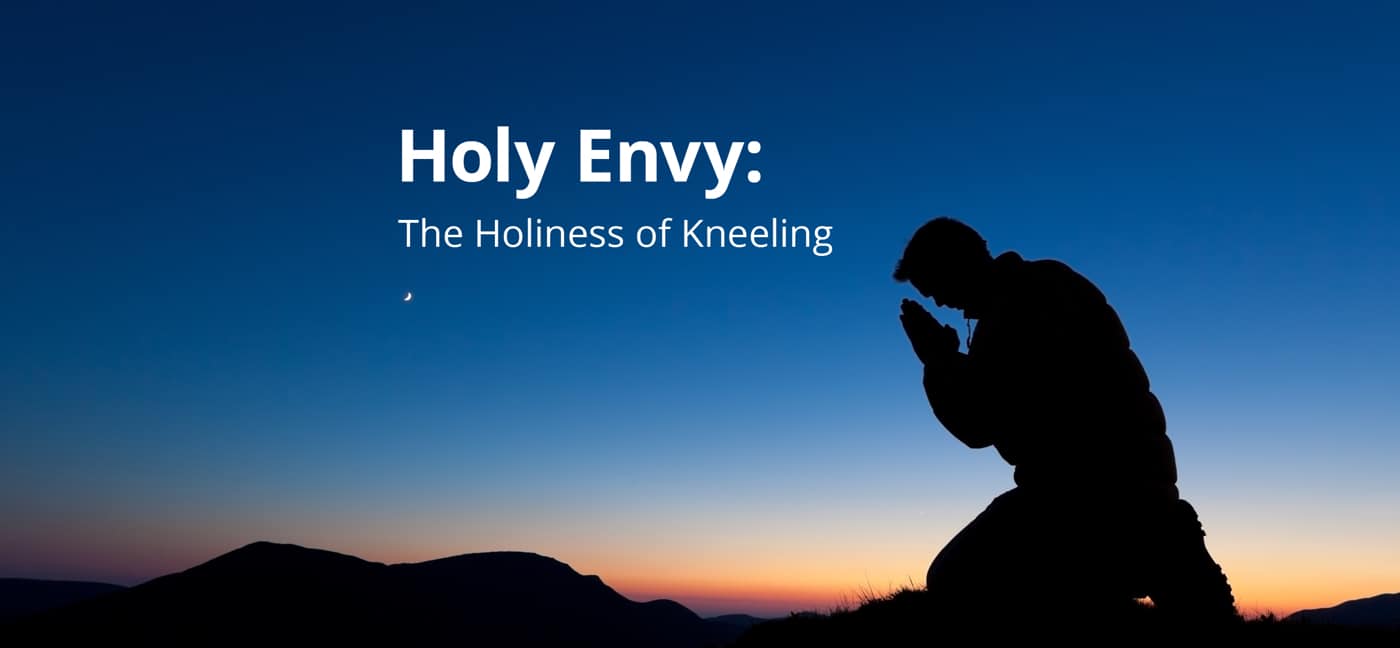Holy Envy: The Holiness of Kneeling

In Judaism, or certainly in the Orthodox Jewish tradition, we’re not supposed to imitate, much less envy, the ways of the gentiles, a name we give to those outside our faith. So when Krister Stendhal, the late Bishop of Stockholm, urged believers to look for the admirable in other religions, I did not entirely know what to make of it. Does my own faith, the one true faith if I’m right, lack something? Did God give other peoples better ways to serve Him?
These questions do not preoccupy me unduly. But there is one thing I particularly admire. It is, perhaps, the simplest religious act of all.
“Now I lay me down to sleep, I pray the Lord my soul to keep.” In America, a country whose religious culture is shaped by Christian ways of worship, it is the child kneeling by the bedside that often comes to mind when I think of prayer. This is so despite the fact that I recite the prescribed Jewish prayers three times a day. For Ultra-orthodox Jews, who are more insular, the dominant culture’s images play far less a role in shaping their religious imagination. But, for me, a Modern Orthodox Jew, who, in my youth, consumed the same books, movies, television shows as my fellow citizens, the image of the child knelt in prayer is strong.
What does this act of kneeling mean? To kneel is to humble oneself. It is to show reverence. Submission. Sometimes it is to beg. Other times it is to surrender to overwhelming pain. One story I will never forget is of a great rabbi who, upon hearing that his wife of many years had passed away, fell to his knees in grief, sobbing and wrapping his arms around God’s ankles, as it were. Perhaps being on one’s knees is so compelling because it is not always a voluntary act, but an involuntary expression of being physically, emotionally, or spiritually destitute.
In Judaism, we take kneeling very seriously. In ancient times, this act took place at the Temple in Jerusalem when, on the holiest of days, the high priest pronounced the ineffable name of God. Nowadays, we reserve kneeling (and bowing down from our knees) for a few moments during the High Holidays, especially in the part of the liturgy that recounts the Temple scene. But never besides then. In refraining from kneeling at all other times, in prayer and not, we demonstrate that nothing equates to the Temple experience. Indeed, depending on the flooring of the synagogue, we often put down a cloth or paper towel to avoid incidentally touching down on a marble or even wood surface.
Moreover, during the holiest prayers in our liturgy, including our daily recitals, we stand fully erect, feet together, in imitation of the angels who are said to appear to have only one leg (like our two legs together) and no knees. So, kneeling in prayer is not only rare for Jews but also not necessarily our most sanctified stance.
And yet—and yet—when I am feeling most humble (not often, to be sure) or desperate (not often, either, thank God) or praiseful (working on that one), I feel the urge to kneel. I don’t do it, but I almost wish I could. At those times, I am slightly jealous of my Catholic friends who kneel each week (or day) at Mass. We Jews are ever mindful of the fact that worship is not just a function of the mind and the lips, but of one’s entire being. We regularly enact the Psalmist’s image “All my bones shall say, Lord, who is like unto thee” (Psalms 35:10) by swaying back and forth as we pray. It is a characteristically Jewish image — somewhat like the Evangelical Protestant with outstretched arms, hands high in the air — a trademark of our faith that is alien to all others.
So, it is not that my tradition is insensitive to praying with one’s whole self — with heart, soul, and might devoted in concert to God. Rather, it is being schooled in a faith that values embodied worship and at the same time in a culture that has powerful depictions of knelt prayer that may explain why I am tempted to take a knee from time to time. Spontaneously. Or perhaps the urge to kneel before God is built into our nature as humans, and the God of Israel disciplines us to genuflect only before Him in His house.
As an Orthodox Jew, I will continue to kneel only in the holiest of moments and places. As God would have me do. But whenever I behold seekers of divine comfort drop to their knees in prayer, I will still be moved to a spiritual solidarity that makes this world a humbler place.
Daniel Mark is a professor of political science at Villanova University and currently a visiting fellow in the Department of Political Science at the University of Notre Dame. He also serves as the Chairman of the United States Commission on International Religious Freedom.
Editor’s note: This essay is part of an ongoing series on Holy Envy. People of various religions explain what they admire in other faiths. The purpose is to increase understanding and solidarity between believers.
![]()



